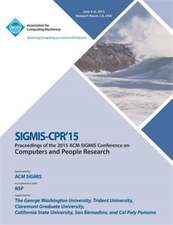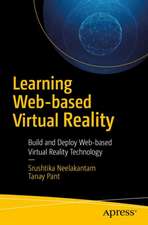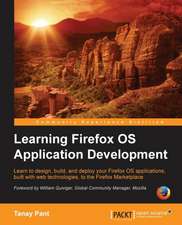Building a Virtual Assistant for Raspberry Pi: The practical guide for constructing a voice-controlled virtual assistant
Autor Tanay Panten Limba Engleză Paperback – 28 iul 2016
You will develop a music playing application as well as a note taking application for Melissa, laying the foundations for how Melissa can be further extended. Finally, you will learn how to deploy this software to your Raspberry Pi and how you can further scale Melissa to make her more intelligent, interactive and how you can use her in other projects such as home automation as well.
What You'll Learn
- Design the workflow and discover the concepts of building a voice controlled assistant
- Develop modules for having conversations with the assistant
- Enable the assistant to retrieve information from the internet
- Build utilities like a music player and a note taking application for the virtual assistant
- Integrate this software with a Raspberry Pi
Anyone who has built a home automation project with Raspberry Pi and now want to enhance it by making it voice-controlled. The book would also interest students from computer science or related disciplines.
Preț: 222.50 lei
Preț vechi: 278.11 lei
-20% Nou
Puncte Express: 334
Preț estimativ în valută:
42.57€ • 44.46$ • 35.16£
42.57€ • 44.46$ • 35.16£
Carte tipărită la comandă
Livrare economică 15-29 aprilie
Preluare comenzi: 021 569.72.76
Specificații
ISBN-13: 9781484221662
ISBN-10: 1484221664
Pagini: 124
Ilustrații: XVII, 95 p. 27 illus. in color.
Dimensiuni: 155 x 235 x 6 mm
Greutate: 0.17 kg
Ediția:1st ed.
Editura: Apress
Colecția Apress
Locul publicării:Berkeley, CA, United States
ISBN-10: 1484221664
Pagini: 124
Ilustrații: XVII, 95 p. 27 illus. in color.
Dimensiuni: 155 x 235 x 6 mm
Greutate: 0.17 kg
Ediția:1st ed.
Editura: Apress
Colecția Apress
Locul publicării:Berkeley, CA, United States
Cuprins
Chapter 1: Introduction to Virtual Assistants
Chapter 2: Understanding and Building an Application with STT and TTS
Chapter 3: Getting Your Hands Dirty: Conversation Module
Chapter 4: Using the Internet to Gather Information
Chapter 5: Developing a Music Player for Melissa
Chapter 6: Developing a Note Taking Application
Chapter 7: Building a Voice Controlled Interface for Twitter and Imgur
Chapter 8: Building a Voice Controlled Interface for Twitter and Imgur
Chapter 9: Integrating Software with Raspberry Pi and Next Steps
Chapter 2: Understanding and Building an Application with STT and TTS
Chapter 3: Getting Your Hands Dirty: Conversation Module
Chapter 4: Using the Internet to Gather Information
Chapter 5: Developing a Music Player for Melissa
Chapter 6: Developing a Note Taking Application
Chapter 7: Building a Voice Controlled Interface for Twitter and Imgur
Chapter 8: Building a Voice Controlled Interface for Twitter and Imgur
Chapter 9: Integrating Software with Raspberry Pi and Next Steps
Notă biografică
Tanay Pant is an Indian author, hacker, developer and tech enthusiast. He is best known for his work on "Learning Firefox OS Application Development" which was published by Packt. He is also an official representative of Mozilla. He has been listed in the about:credits of the Firefox web browser for his contributions to the different open source projects of the Mozilla Foundation.
He also writes for a number of websites like SitePoint and Tuts+ where he shares tips and tricks about web development as well his opinions on different products. He digitally published Code Zer0 in his younger days to spread awareness about cyber security and hacker culture.
He is also the chief architect of Stock Wolf, a global virtual stock trading platform that aims to impart practical education about stocks and markets. This platform has acquired more than 100 colleges and has players from about 15 countries.
He is also the chief architect of Stock Wolf, a global virtual stock trading platform that aims to impart practical education about stocks and markets. This platform has acquired more than 100 colleges and has players from about 15 countries.
Caracteristici
Develop your own voice controlled assistant, Melissa, in Python Learn concepts by making Melissa more intelligent as we progress along the book Strengthen concepts by building scalable modules for Melissa Discuss how Melissa can be scaled for enterprise quality products so that the learning continues













